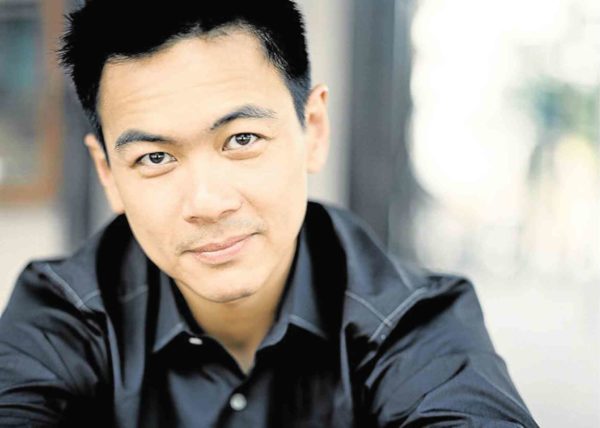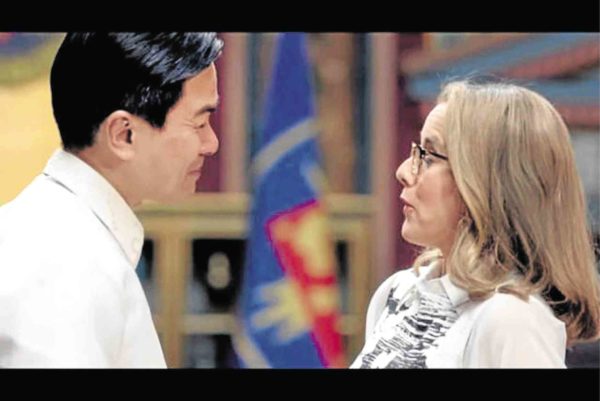A Fil-Am actor’s life: Joel de la Fuente

Joel de la Fuente
Sixth of a series
LOS ANGELES—Joel de la Fuente has been racking up noteworthy credits as an actor over the years. But it only took one turn as president of the Philippines to make many people Google him.
The controversy that erupted over his role as a lascivious Pinoy head of state in scenes opposite Tea Leoni’s titular character in “Madam Secretary” threw a spotlight on the New York-based actor.
Joel is in not one but two Emmy-winning original series—as chief inspector Takeshi Kido in Amazon Studios’ “The Man in the High Castle” and as Dr. Johann Pryce in Netflix’s “Hemlock Grove.”
Joel’s other TV credits include 10 seasons as Taru technician Ruben Morales in “Law & Order: Special Victims Unit,” “Space: Above & Beyond” (Lt. Paul Wang), and recurring roles in various series, from Sidney Lumet’s “100 Centre Street,” “ER” to Steven Spielberg’s “High Incident.”
Article continues after this advertisementBut it was Joel’s part as a Filipino leader, which some thought was a veiled hit at President Duterte, that drew tons of media exposure. Read Joel’s take on the controversy in his answers below.
Article continues after this advertisementIn film, Joel will be seen in Jennifer Lawrence’s much-awaited “Red Sparrow,” directed by Francis Lawrence.
His other screen roles include “Brief Reunion,” “Personal Velocity” (Sundance Grand Jury winner), “The Adjustment Bureau,” “The Happening” and “Return to Paradise.”
The Brown University and New York University (graduate acting program) alumnus has been charting an impressive career in theater.
Among Joel’s stage performances are “Hold These Truths” (Drama Desk nomination: best solo performance), the title role in “Ivanov,” Claudio in “Beatrice and Benedict” with the New York Philharmonic (conducted by Sir Colin Davis), Valentine in “The Two Gentlemen of Verona,” and Iago in “Othello.”
Joel cowrote “Life Document 2: Identity” (with Pulitzer Prize winner Ayad Akhtar), which won the Columbia Students award for best film in 2002.

Tea Leoni in “Madam Secretary” episode
Excerpts from our chat:
How would you describe your journey as an actor so far? I got my SAG (Screen Actors Guild) card in 1990. It’s been a long journey with many ups and downs. I feel grateful every day that I get to pursue this as my life’s work.
How do you prepare for an audition? Any good luck rituals? Everything I do is an attempt to relax and put myself in a position to listen and react with confidence and openness.
So, I try to be as prepared as possible, as on time (or early) as possible, as uncluttered as I can manage.
What is the most frustrating part of trying to land roles in Hollywood? I would always like more opportunity. The more opportunities there are, the less frustrating things feel.
But, the truth is, there are only so many roles out there, and there are oh so many actors. Frustration is a constant companion. Might as well make friends with it.
How do you handle rejection? It varies. Sometimes, poorly. It always hurts. But, there’s so much more to life than getting a role or not. It’s up to me to maintain perspective and find as many things as I can to lead a fulfilling life. But it’s a challenge, for sure.
Have there been times when you almost gave up? What motivated you to keep trying? If one is honest with oneself, questioning this lifestyle should come up fairly regularly. It can be a very difficult way to make a living, despite the rewards.
Checking in to see if this is something I wish to keep doing is healthy, because it reminds me that, like most things in life, it’s a choice. I choose to pursue this lifestyle. Knowing that is quite empowering.
It’s hard to articulate what has kept me going during the hard times. One of the biggest things: I’ve been so lucky to be surrounded by beautiful, loving family and friends. I have drawn much strength and resilience from their generosity and care.
As an actor of color, do you feel that opportunities for minorities are improving or getting worse? They are improving, especially in television. The days of three (or four) networks choosing most of the content we see are over.
There are more than 400 scripted shows today on almost every conceivable platform.
There is a diversity of voice that is unprecedented, and a growing appetite to see the world reflected in many different ways.
On top of that, there is a stronger, more unified communicative group of people who are less tolerant of poor, or unfair, representation in Hollywood. People are speaking up—and speaking up with their dollars.
What’s your stand on whitewashing—or the casting practice in which white actors are cast in nonwhite character roles—in Hollywood? In the end, it’s not about white people playing nonwhite roles. It’s about opportunity.
Historically, white men get to play all the parts. They get to control the narrative to all the stories. Is this fair or appropriate? For me, I just find it less and less interesting.
I love seeing all kinds of people tell all kinds of stories. I am a better person and artist because of it.
In the end, as a character actor, I would love to play all kinds of roles outside myself—outside my race, ethnicity and life experience. That’s part of what acting is.
But, we are in a time in our society where we must balance that, knowing that we come from a history of exclusion and nondiversity. I’m all for white men and white men narratives—but as one part of a varied palette.
When you were filming that “Madam Secretary” episode where you played Datu Andrada, did you think at all that the episode might generate controversy? Of course.
And when the controversy erupted—with the issue landing even on Time magazine and other top media outlets—were you surprised? Nothing really surprised me about it. The show provoked a lot of dialogue and discussion. If they were so inclined, it made people think, myself included.
At the end of the day, it was a fictional story about fictional people. These people had similarities to real-life figures, to be sure, but Andrada had more parallels with other world figures than any Filipino president.
What kind of feedback did you get personally? It ran the gamut. People were moved strongly in all directions.
You are in “Red Sparrow.” Francis Lawrence showed us extended footage last May. What was your experience like filming that movie? I play a senator who may be a pawn in a much bigger game. I had a brief, but very positive, experience on the film. And my stuff was shot in Budapest, which is a really beautiful part of the world.
To people who are planning to pursue acting, what should they prepare for? Prepare your material, but be open for the unexpected. Have respect for the craft and for those you work with.
Take good and generous care of yourself. You are running a marathon, not a sprint—make choices accordingly.
(To be continued on Thursday)
E-mail rvnepales_5585@yahoo.com. Follow him at https://twitter.com/nepalesruben.